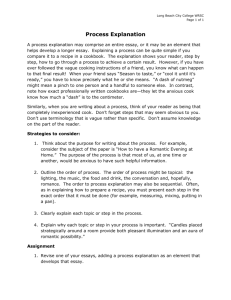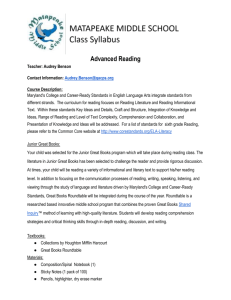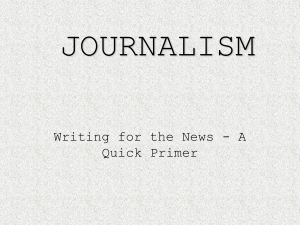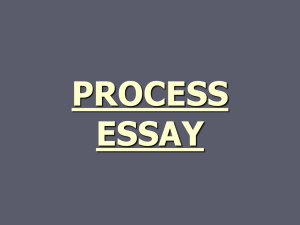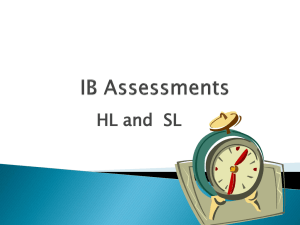Show vs. Tell Writing by Marcie Belgard
advertisement
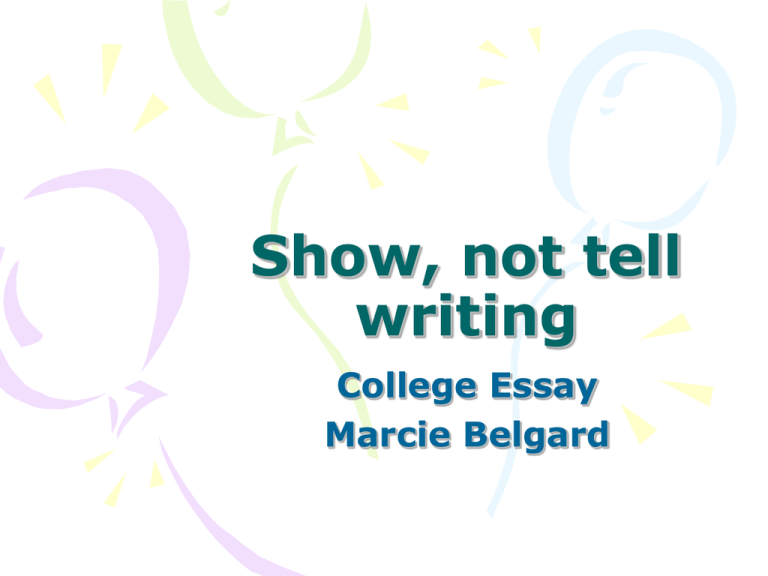
Show, not tell writing College Essay Marcie Belgard Show, don’t tell • The college essay prompt often asks you to think about the impact of past events. • The essay, however, never tells the reader these thing directly; instead, it shows the reader through concrete experiences. Tell Show I was not worried. I had watched my brother slog through it the year before, knee-deep in homework. I love playing football. “Would you do something else?” my mother asked. “Never,” was my answer. I was scared. I am clueless. War exploded on our doorstep as the town began to crumble. An ugly, blank page glared directly at me. Another Definition of Telling and Showing • When you tell, the reader does not see the person “tying his shoes” nor does the reader see the actual tying of a shoelace. • When you show, the reader can see what is being talked about as though he were viewing a picture. The reader sees the person “shift the weight of his body to one side while kneeling down to tie his right shoe.” The writer, therefore, is like a painter. Another One • Show writing involves the audience by showing them what was said, how it was said, how someone moved, what they saw. It takes the audience to the scene--makes it come alive for them. • Tell writing keeps the audience at arm's length. It sends the message “Stay away! Don't get involved. Just skim the surface.” DON'T SAY THE OLD LADY SCREAMED. BRING HER ON AND LET HER SCREAM. -Mark Twain LET’S BE AVID ABOUT SHOW WRITING • A = Action • V = Vivid Verbs • I = Imagery • D = Dialogue Which lead is show writing? Why is it better? • I have worked on many drama productions. Recently, I was the student director to Les Miserable. Opening night was so exciting. We had worked on this production for 11 ½ months. • Climbing the narrow stairs, I stumble slightly as my toe catches the heel of the person in front of me. She turns around and smiles anxiously, knowing precisely what is going through my mind and understanding that my mental self is not in this stairwell but up ahead on the stage where we will perform. This, this night, is what we have worked so hard for the last 11½ months. Describe a risk that you have taken and discuss its impact on your life. I had wanted to play junior varsity basketball as long as I can remember. I had played on the junior varsity team at Hanford and was disappointed when I was passed over my sophomore year, but now that I was a junior I figured I would get the position I wanted. I knew my weaknesses and strengths, but I figured my hard work and dedication would pay off. Using show writing Waiting anxiously outside the meeting room for my teammate to finish talking to the coaches, I paced cold handed around the school. When she stepped out of the room, she had a slight smile, "Your turn." I could tell that she had made the cut, but the question was, would I? Describe yourself using show writing You will be handed a card with a characteristic written on it. DO NOT show the card to anyone else! This is very important! INSTRUCTIONS You will use show writing to describe yourself displaying this characteristic. DO NOT use the adjective in the piece of writing! WHAT CHARACTERISTIC IS BEING DESCRIBED? “Where’s you lunch?” she asked. “I didn’t bring one.” Opening her bag, she took out a huge sandwich wrapped in foil. She quickly brought out a plastic knife and cut the sandwich in two. “Here. I don’t need the entire thing.” Another Example Nestled in a quiet corner of the chemistry library, I lay against the wall, glasses askew as I feign the effects of sleep in an attempt to actually induce sleep. I’ve found my life here on campus – the urgency to protest and change, the impending debacle of greenhouse gas emissions, the hours and hours of Socratic circles that lend many answers yet open the doors to many new questions. I’ve found an expression of myself in the city that I’ve never found anywhere else. Being away from home has changed me. I smile and think about how much better my life has become. I have found my place.


